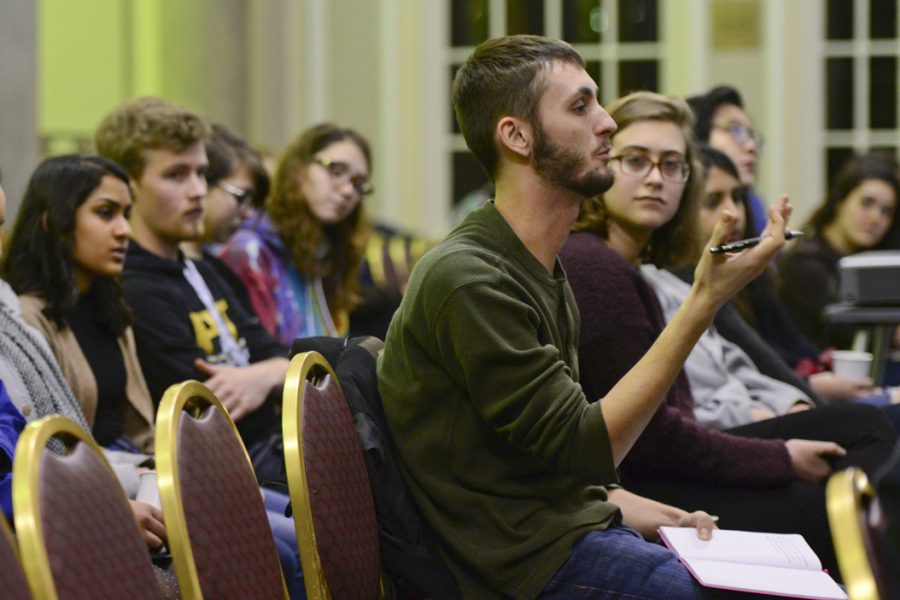With the abundance of protests and marches happening around Pitt’s campus recently, many students are wondering if the public’s calls for change will be left unanswered. At a Wednesday night panel, Pitt professors and activists encouraged students to continue championing local movements.
The Fossil Free Pitt Coalition and Free the Planet hosted a two-panel event Wednesday to discuss how to effectively protest and organize social support in the beginning weeks of Trump’s presidency. Pitt sociology professors and local social justice organizers spoke during the one-and-a-half-hour event, answering audience questions and discussing their personal contributions to the Pittsburgh community. Speakers also gave advice to Pitt students about how smaller efforts — including calling local leaders or engaging in social media — can contribute to larger change.
Dana Moss, a new assistant professor in the department, co-founded the Yemen Peace Project in 2010. YPP is the only organization in California dedicated to lobbying against misconceptions about Yemen — from clarifying detail on malnutrition in the country to emphasizing the importance of humanitarian efforts taking place in Yemen. Now, Moss said she is most concerned about the immigrant and refugee ban because it “directly impacts communities [she] knows and works with.”
She said she is encouraged by people who stand up but knows that it can be scary. She emphasized that planning ahead and organizing resources are what make social movement effective.
“We can pontificate all day about social movement theory, but it’s great to have people come in who work locally,” she said.
Fellow sociology professors Tarun Banerjee and Jackie Smith followed up with comments on Trump’s first days in office. Banerjee, whose focus is public policy, said there are many ways the current administration is “pretty damn terrible.” To make an impact, he said social movements should target large corporations rather than government institutions.
“There is a lack of democracy and responsiveness in the government,” he said. “It is a mistake for people to think we can bring about change by targeting elected officials.”
Smith, who began her career in sociology by studying globalization and international social movements, now advocates more for localized efforts, connecting them to an “accelerating snowball” that quickly gains momentum.
“This is where we have to act: in Pittsburgh,” Smith said.
In response to public concern that the heavily Republican government is resistant to pass progressive legislation, the professors encouraged students to get creative with their efforts.
“Protest is pretty cheap and easy, but it’s not necessarily what you always need to bring about change,” Moss said.
Instead, Banerjee recommends reaching out to banks, large corporations and even local military branches to find the right resources and people who can solve a social issue. Smith mentioned the value of local networking for sharing ideas and protecting each other during the fight to defend our democracy.
When asked how students can get involved in local social movements, Moss and Smith spoke about the importance of getting a message out to the public, finding supporters and gaining recognition through social media.
“We need more communicators to tell the story that the mass media doesn’t,” Smith said.
Eva Resnick-Day, who graduated from Pitt in 2012, spoke after the panel on her involvement with Greenpeace USA. Through the organization, she participated in nonviolently protesting international issues including oil drilling in the Arctic and non-inclusive legislation. While the job taught her about asking people in power tough questions — like asking Hillary Clinton at a rally to reject fossil fuel contributions — she left to focus on Pittsburgh’s issues.
“It takes a lot of behind the scenes work to create change and make that final product,” Resnick-Day said.
After the event, panel members provided the audience with contact information for specific organizations that Pitt students can get involved with, both on and off campus.
With her hands full of flyers, junior psychology major Savanna Melton said students should take notes from the activists who have come before them.
“It’s important to show up and learn from other people’s experiences,” Melton said. “In this age you really need all the advice you can get.”



